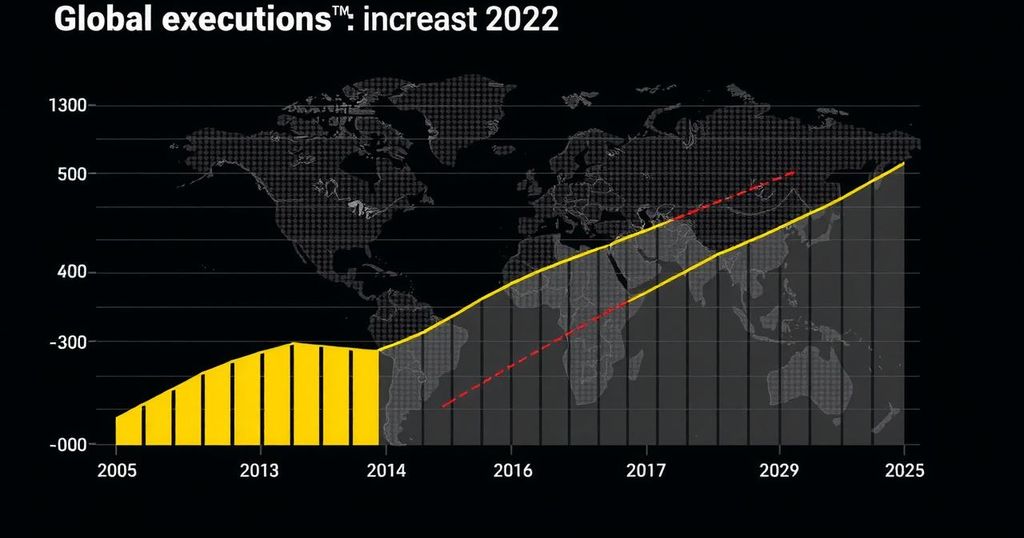Amnesty International Reports Significant Increase in Global Executions for 2022

Amnesty International’s report for 2022 indicates a 53% rise in global executions, primarily in Iran and Saudi Arabia. The report highlights Indonesia’s alarming number of new death sentences for drug-related offenses while revealing secrecy in several countries’ death penalty practices. Globally, the push against capital punishment continues, with 112 nations having abolished the death penalty.
Amnesty International’s annual report for 2022 reveals a dramatic 53% increase in global executions from the previous year, highlighting significant surges particularly in Iran and Saudi Arabia. The report indicates that Iran accounted for 70% of executions in the Middle East and North Africa, with execution figures soaring by 83%—rising from 314 in 2021 to 576 in 2022. Furthermore, Saudi Arabia witnessed a tripling of executions, escalating from 65 in 2021 to 196 in 2022. Other countries, including Kuwait, Myanmar, the Palestinian territories, Singapore, and the United States, also reported notable increases in the death penalty. Overall, 20 countries executed a total of 883 individuals in 2022, compared to 579 in 18 countries in 2021. Despite these figures, the report emphasizes that secrecy and restrictive governmental practices hinder accurate assessments of the death penalty’s use in several nations, notably China, North Korea, and Vietnam. In Indonesia, Amnesty documented 112 new death sentences, with 94% resulting from drug-related offenses which do not meet international law’s classification of “most serious crimes.” In the Asia-Pacific region, Bangladesh recorded the highest number of death sentences (169), followed closely by India (165) and Pakistan (127). Indonesia maintains the death penalty for severe crimes, including murder, terrorism, and drug trafficking, typically executed by firing squad. The last recorded executions in Indonesia occurred in July 2016. The report further reveals that drug-related offenses accounted for at least 325 executions carried out in countries such as China, Iran, Saudi Arabia, and Singapore, which more than doubled from 2021. Despite these rising numbers, a noteworthy development includes the abolition of the death penalty in 112 countries, with Papua New Guinea among the latest to join this group. Meanwhile, Malaysia is actively pursuing reforms to its mandatory death sentence policies.
The increase in executions worldwide has raised alarms among human rights organizations, particularly Amnesty International. The rise emphasizes the continued reliance on the death penalty in specific regions, particularly in the Middle East. Iran’s substantial increase in executions and the alarming rates in Saudi Arabia underline the harsh application of capital punishment in these countries. Indonesia’s situation is particularly concerning due to its significant number of new death sentences, predominantly for drug-related crimes. The contrast between countries abolishing the death penalty and those reinforcing it highlights a global human rights debate regarding the efficacy and morality of capital punishment.
In conclusion, Amnesty International’s report reveals a stark increase in global executions in 2022, driven predominantly by Iran and Saudi Arabia, with significant implications for human rights. The report urges a reevaluation of the death penalty, particularly in terms of its application for non-violent drug offenses in countries such as Indonesia. While some nations take steps toward abolition, others persist in execution practices, signaling a divided global stance on capital punishment and its repercussions on human rights.
Original Source: www.pbs.org








